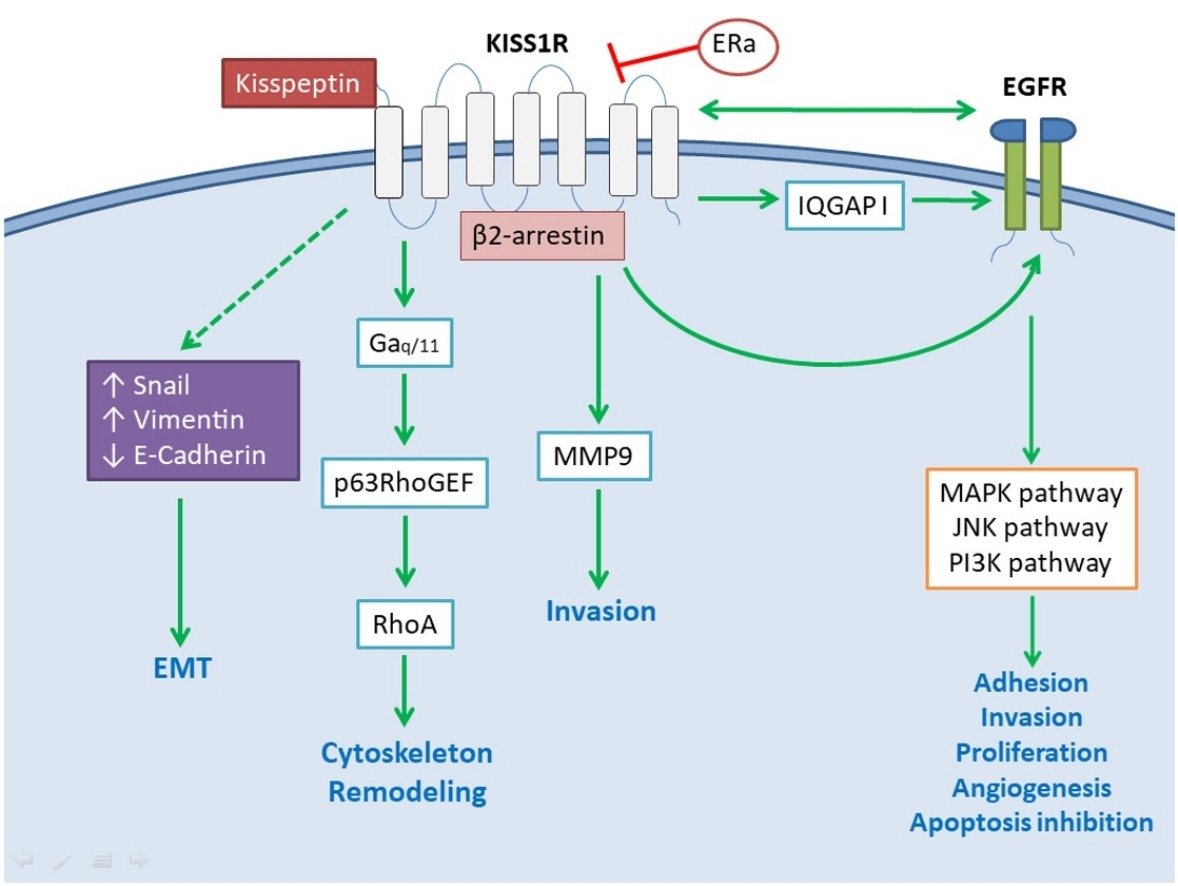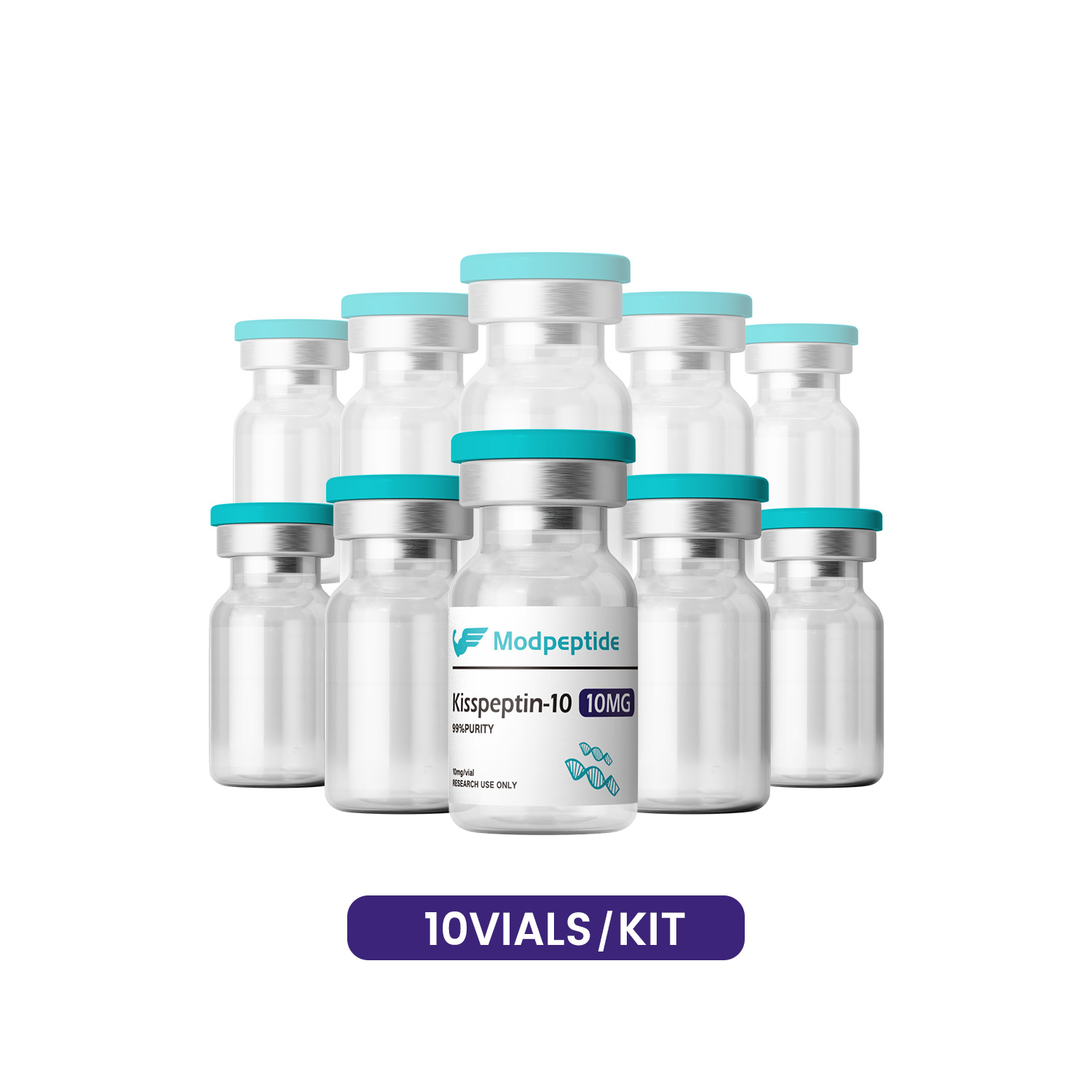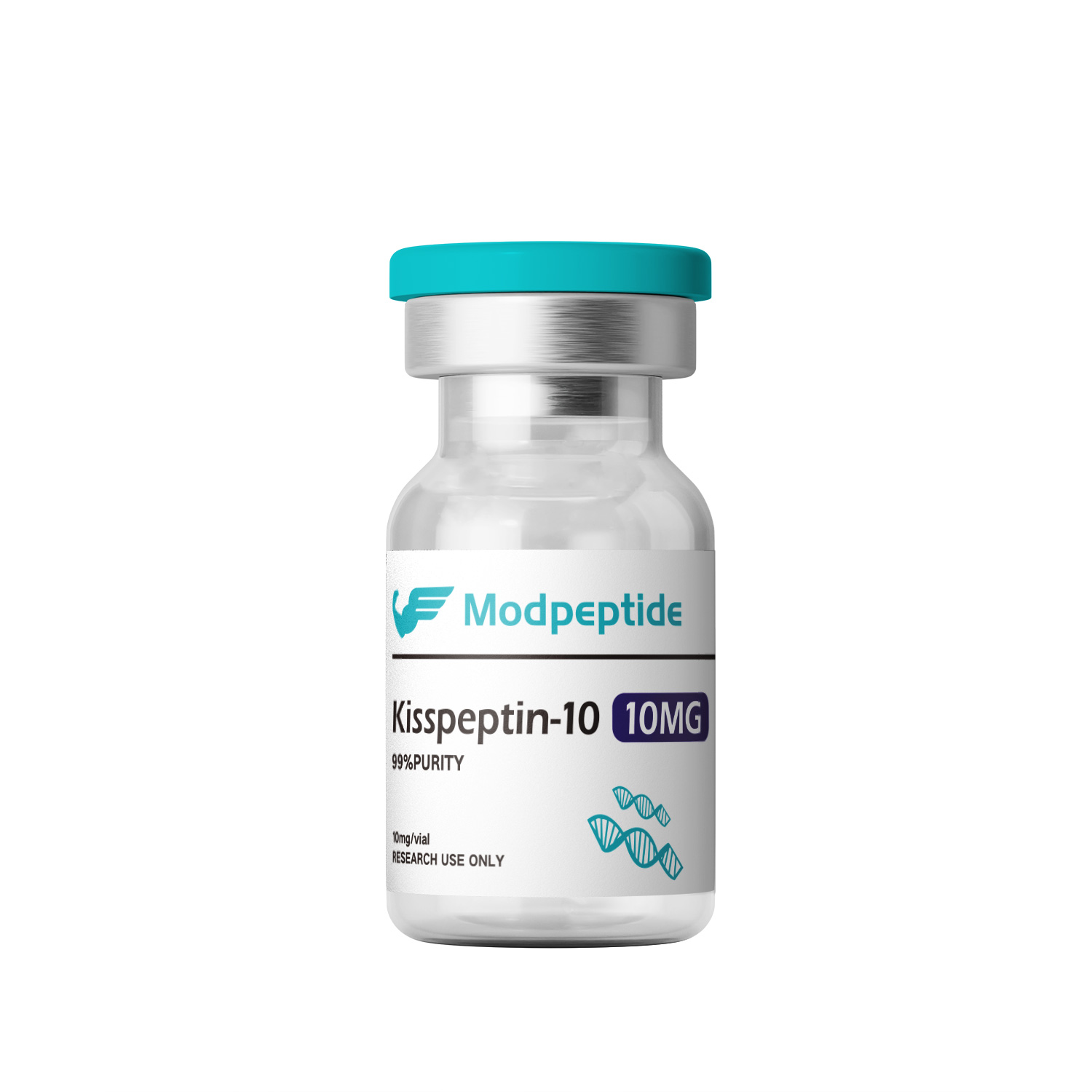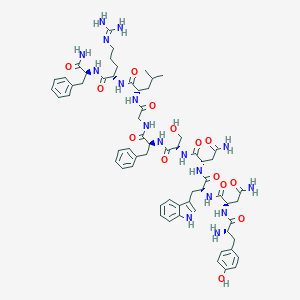0
Total 100mg Kisspeptin Per Kit
Kisspeptin 10mg/vial x 10vials
Quantity
ADD TO CART
Important Notices:
· This product is sold for scientific research purposes only.
· Product is provided as a lyophilized (freeze-dried) powder in a sealed, sterile vial.
· The quantity on the label refers to the total amount of product inside each vial.
· Additional lab supplies are required for conducting research such as bacteriostatic water for reconstitution, syringes & needles to draw from the vials, and alcohol prep pads for sanitizing vial stoppers prior to needle insertion.
· Vial appearance, label, seal and cap colors may vary from product photos.
· This product is sold for scientific research purposes only.
· Product is provided as a lyophilized (freeze-dried) powder in a sealed, sterile vial.
· The quantity on the label refers to the total amount of product inside each vial.
· Additional lab supplies are required for conducting research such as bacteriostatic water for reconstitution, syringes & needles to draw from the vials, and alcohol prep pads for sanitizing vial stoppers prior to needle insertion.
· Vial appearance, label, seal and cap colors may vary from product photos.
-
Detail
What is Kisspeptin-10?
Kisspeptin (a.k.a. metastin) is a naturally occurring protein in humans that plays important roles in hormone signaling during puberty and reproduction. It is also thought to alter mood and behavior, promote angiogenesis, and regulate kidney function. The peptide has also been found in the brain and is known to suppress tumor growth and metastasis (spread). The peptide is of greatest scientific interest for its ability to influence gonadotropin releasing hormone (GnRH).
Kisspeptin-10 Structure
equence: YNWNSFGLRF
Molecular Formula: C63H83N17O14
Molecular Weight: 1302.4 g/mol
PubChem CID: 25240297
Synonyms: KISS-1, Protein KISS-1, metastin, Kp-10 peptideKisspeptin-10 Research
Boosting Gonadotropin-Releasing Hormone
Gonadotropin-releasing hormone (GnRH) is synthesized in and released from GnRH neurons in the hypothalamus. It is the first hormone released in the hypothalamic-pituitary-gonadal axis and controls the release of follicle-stimulating hormone (FSH) and luteinizing hormone (LH) from the anterior pituitary gland. GnRH is the primary driver of puberty and controls the maturation of gametes in the genitals. It is used therapeutically to control menstruation in select settings, as a treatment for precocious puberty, and as a continuous infusion in certain types of cancer.
Increasing Testosterone
By affecting circulating levels of LH and FSH, kisspeptin can alter testosterone levels. This alteration, however, appears to be sex specific. In men, kisspeptin increases testosterone levels while in women it has no discernible impact on testosterone. In one study, 6 men were administered a derivative of kisspeptin via IV. They showed a significant increase in plasma testosterone levels (nearly 3-fold) after just 90 minutes[1]. A different analog of kisspeptin has been found to alter the pulse frequency of LH in men, suggesting that kisspeptin helps to fine tune the normal pulsatile release of sex hormones. A study of healthy men given kisspeptin-10 revealed a rapid and dose-dependent increase in serum LH levels and a concomitant increase in testosterone levels. Kisspeptin-10 appears to achieve this feat by increasing the pulsatile release of LH. If given at high enough doses, kisspeptin-10 causes such rapid pulsation as to obscure individual pulses entirely, resulting in continuous LH release[2]. This finding opens the door for potential uses of kisspeptin and its analogues in a variety of settings from pregnancy to low testosterone levels and more.
Energy Balance
Kisspeptin neurons have long been known to be sensitive to the energy status of an individual. Both under-nutrition and severe over-nutrition can blunt the action of kisspeptin neurons in stimulating GnRH release. In fact, drastic changes in energy balance can lead to infertility in both men and women, a process that appears to be mediated by kisspeptin.
So it is well understood that kisspeptin production and release is sensitive to energy balance. What is becoming clearer, however, is that kisspeptin may itself regulate energy balance. This finding arose through the observation of mice in which the kisspeptin receptor (Kiss1r) was removed via genetic manipulation. These mice showed increased adiposity and reduced energy expenditure. It turns out that the kisspeptin receptor is found in adipose (fat) tissue and brown adipose tissue[3]. It should not come as a surprise that kisspeptin plays a role in energy balance as energy status and reproductive fitness have always been tightly linked. It seems that kisspeptin may be one link that helps to explain the neurochemical control that leads to energy modulating behavior in relation to reproduction.
Cancer Research
Twenty years ago, it was discovered that kisspeptin is capable of suppressing metastasis of melanoma (malignant skin cancer) by as much as 95%. It appears that the peptide produces this effect by reducing cancer cell migration. There is also some question as to whether kisspeptin can reduce cell adhesion and thereby prevent cancer cells from sticking to other tissues and invading them. Screening of a variety of metastatic cancer types reveals that breast, bladder, GI, prostate, pancreatic, ovarian, skin, and thyroid cancers all show changes (generally decreases) in kisspeptin levels, confirming that the peptide plays a role in the spread of cancer[4].

The interest in kisspeptin for the treatment of cancer has waxed and waned as a result of the incredible complexity of this peptide. Research is ongoing to understand exactly how the peptide can be manipulated, cut, recombined, and altered to produce effects in various cancer types. It is not so much that the peptide doesn’t work but rather than kisspeptin has so many effects that teasing out its precise impact on various cancer cells is difficult[5]. Dr. Floriana Morgillo implores researchers to take on the complexities of kisspeptin to realize the tremendous potential of this peptide to treat cancer. As she points out, kisspeptin could block metastasis in multiple organs and drastically reduce disease burden, adding years to lifespan of cancer patients and making it easier for current treatments to induce remission.
An interesting connection between kisspeptin, melatonin, and cancer was discovered only in the early months of 2020 when an experiment linked levels of the peptides to exposure to daylight. In the experiment, mice exposed to daylight and darkness showed drastically different levels of melatonin and kisspeptin. Those exposed to daylight had high kisspeptin levels and low melatonin levels. The opposite was true of those kept in the dark. To add to the experiment’s value, the mice were injected with melanoma cells. It turns out that the daylight mice had high tumor growth rates and tumor volume. No measure was made of metastasis. It appears that melatonin and kisspeptin are both involved in tumor suppression such that one influences the other, but the exact connection remains unknown[6]. This is just one example of the complex ways in which kisspeptin interacts with the body to alter tumor growth.
Studied Memory Enhancement
It appears that certain analogs to kisspeptin are important in the areas of the brain responsible for memory consolidation and orientation in 3-D space. Research in mice suggests that administration of these peptides can help to reverse the learning and navigational impairment often seen in ethanol intoxication[7]. This suggests that kisspeptin and its analogues play a role in the ability of neurons to encode information and may make these peptides of potential interest in offsetting learning deficits seen in certain genetic and chronic disease situations. While this research is in its early stages, it helps to widen our understanding of learning and push us further toward the development of nootropics that can help to stimulate both health and damaged brains to improve function.
Impact on Mood
Just like reproduction and energy status are interconnected, so too are reproduction and emotion interconnected. Given the role of kisspeptin in both reproduction and energy homeostasis, researchers questioned how the peptide might influence emotion and behavior. To test this connection, they compared kisspeptin to placebo administration in 29 healthy heterosexual men. Individuals given kisspeptin showed enhanced limbic brain activity. In particular, the individuals showed increased reward-seeking behavior, increased drive, and improved overall mood[8]. It would appear that kisspeptin plays a role in integrating sexual and emotional brain processing with the overall process of reproduction. These findings help to further our understanding of mood, motivation, and drive not just as they relate to sex, but as they relate to human behavior in general.
Kidney and Heart
Much is made of the role of kisspeptin in reproduction and reproductive hormone control. It comes as a bit of surprise then to learn that kisspeptin is also important in the kidney. Kisspeptin and its receptor are found in several locations throughout the kidney and are thought to play a role in signaling kidney function. Research in mice lacking the Kiss1 receptor reveals that the peptide is important in ensuring glomerular development during development though the exact nature of this action, whether direct or indirect, remains to be elucidated[9].
Though the exact role of kisspeptin in the kidney is not understood, it appears that it may relate to the protein’s larger overall role in controlling vascular development and vascular response to injury. Research in cardiovascular disease in mice suggests that kisspeptin may play an important role certain vascular beds and not others, acting to control vasoconstriction and even cardiac output in specific settings[9]. The impact of kisspeptin in both the kidney and cardiovascular system appears to be related to the effects the peptide has on angiogenesis and vascular function. This same trait may explain the role that kisspeptin plays in reducing metastasis of tumors. Understanding the finer points of how kisspeptin functions in blood vessels will help to move the peptide further into the therapeutic sphere.
Kisspeptin-10 Summary
Kisspeptin is a peptide that acts primarily, but not exclusively, in the brain to control hormone secretion as it relates to human reproduction. There is a great deal of interest in understanding how kisspeptin influences everything from testosterone levels to sex-related behaviors like drive and motivation.
For years it has also been understood that kisspeptin has the potential to influence the growth and metastasis of cancerous cells. Studies have been somewhat contradictory, however, leading to periods of waxing and waning interest in using kisspeptin as a treatment in chemotherapy regimens. The ability o the peptide to influence metastasis may be linked to its role in vascular growth and functioning. Right now, kisspeptin is the subject of a number of intensive trials aimed at deepening our understanding of this versatile and potentially life-saving peptide.
Kisspeptin-10 exhibits minimal to moderate side effects, moderate oral and excellent subcutaneous bioavailability in mice. Per kg dosage in mice does not scale to humans. Kisspeptin-10 for sale at Peptide Sciences is limited to educational and scientific research only, not for human consumption. Only buy Kisspeptin-10 if you are a licensed researcher.
-
Customer ReviewsNo comments



